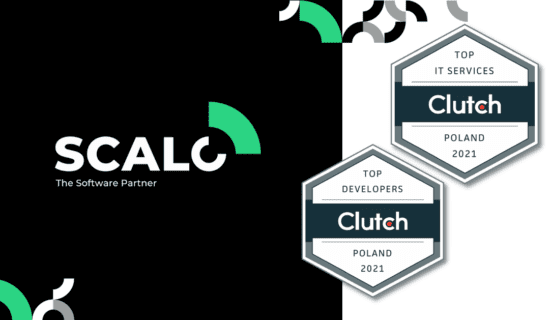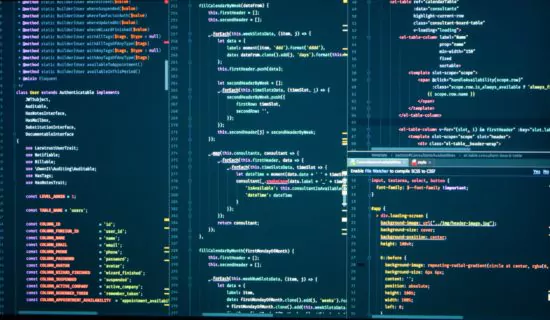The Procurement Department is an important link between the organization and vendors. One of its responsibilities is to prepare procurement proceedings and, in cooperation with other departments, to draft an RFP (Request for Proposal) document. Planning procurement proceedings, for example the procurement process for software development services, is quite a challenge. Therefore, we have prepared this compendium of the preparation of procurement proceedings in the IT industry. We have invited our clients to speak their minds. Representatives of procurement departments have kindly shared their years-long experience in conducting RFP processes below.
When a procurement process is needed?
Procurement proceedings are particularly popular in the IT industry because they make it easy to compare vendors on a number of complex criteria, such as their understanding of the client’s business, industry knowledge, degree of technological expertise, software development methodologies, the way to ensure continuity and quality of work, project management, or communication skills. Given the high complexity of current projects introducing new applications and systems, it is worth opening procurement proceedings when choosing a project partner.
A reasonable time frame for the procurement process
It is worth beginning the procurement process for software development services with setting an appropriate time frame. Setting realistic deadlines will allow for the smooth coordination of the procurement process.
The observations and conversations which we have had with our clients for the needs of this article have shown that a reasonable time frame for a tender for the selection of a software development team provider is 2–8 weeks on average from the moment of distributing the request to the time of submitting a bid.
Stakeholder engagement in the procurement process
A team needs to be assembled, so as to be involved in the creation of the procurement proceedings and in the process of defining requirements, as well as – at the later stages – in the assessment of the vendors’ replies. The team should include a manager responsible for process management, as well as representatives of all stakeholders, i.e. users of the new application and sponsors. The team will also include experts with knowledge of specific areas of the company, who will review the RFP document and the subsequent replies from bidders.
About the RFP document itself
One of the most important issues during the preparation of procurement proceedings and the drafting of an RFP document is to define in detail the scope of the subject matter of the contract as well as to gather the requirements.
‘The complete content of the specification of the subject matter of the contract allows the vendor to smoothly navigate the material’, emphasizes Tomasz Galechan from the Central Procurement Office at Getin Noble Bank SA. ‘A properly prepared specification influences the quantity and quality of the vendors’ questions regarding the RFP and the possibility of having a clear understanding of the intentions, requirements and needs of the ordering party. The key issue is therefore to prepare a thoroughly checked specification – written in an understandable and accessible way, not suggesting only one solution and allowing the presentation of alternative or different solutions’.
Before sending out an RFP, it is also worth verifying that the subject matter of the contract presented as well as the expected results of the project are understandable.
Maciej Stelmachowski, Senior IT Buyer at Vodeno, highlights the key aspects in creating an RFP document:
‘Depending on the procurement goal covered by the RFP, the request should include fundamental issues concerning both the subject matter of the request and the requirements for the request. A vendor or bidder participating in the process or responding to the request should have no difficulty in identifying what the request concerns and whether – based on the information provided – the vendor or bidder is an entity with the capacity to actively participate in the process. Another elementary part of the request should be formal issues related to the organization of the procurement process, on the part of both the seeker and the bidder, i.e. the introduction of appropriate time frames in the process or at its successive stages, the presentation of information about contact persons, and the requirements concerning the mode and form of submitting bids’.
RFPs often include a requirement for the vendor to provide references or, increasingly often, confirmation of their CSR activities as well. As Maciej Stelmachowski emphasizes:
‘The requirement to produce references and proof of CSR activities should not be treated in an either/or manner. In such a situation, a great deal depends on the moment and stage of activity of the company distributing the request for proposal. If (…) the necessity to produce references or prove the implementation of related projects is not an elementary and determining factor for the seeker to consider a given vendor in the process, then – in my opinion – those elements are not obligatory, although it is worth noting they are welcome, especially in the context of references’.
At Scalo – as a provider of development teams – we consider CSR and references in the RFP as lower-priority elements. We believe that it is more important to present the way the development team is built, delivered and onboarded, as well as the methodology for managing the motivation or knowledge of the project team. No less important are the issues related to the price bid (provided that it is required in the RFP).
In Scalo’s opinion, the requirement to provide narrow, specialist references in a particular domain area or within a particular project budget may exclude a vendor meeting the other requirements of the ordering party from participation in the RFP. This is because the process of gathering references takes time and a vendor may not have enough time to obtain appropriate confirmation before the time limit for replying. It is worth taking this into account when designing the requirements for vendors.
What other documents are worth including in the RFP? Tomasz Galechan highlights two important documents:
‘It is advisable to include a user-friendly Excel file with a price list and financial terms. It is also important for the buyer to include a contract proposal regulating the course of cooperation. This is important in order to avoid a situation in which the ordering party and the vendor have reached an agreement on the terms of their cooperation, after which one of the parties questions the provisions of the contract (for example, the ones concerning the GDPR) and, as a result, prolongs the process of selecting a bidder’.
Which vendors to invite to procurement proceedings?
The next step is to select the vendors whom we will invite to participate in the process. It is necessary to identify those of the characteristics of the vendors that will not be acceptable, such as a lack of appropriate domain knowledge or inappropriate methodology for conducting a project. In this way, we reduce the risk of sending requests to unsuitable companies.
‘The stage the seeking organization is at and the pace of its business growth may also be important here’, points out Maciej Stelmachowski. ‘For a company with well-established foundations, and one that possesses large capital, the cost factor may not be as important as for a newly established company that has just started building its brand. Regardless of that, we can find many common factors that may be of greater or lesser importance for companies of different scale and potential, such as: lead time / time frame for delivering the team; competences of the contractors; the ability to form a relationship with the seeking company; being available for contact and providing information; the bidder’s flexibility in the scope of contractual issues; the bidder’s position in the market; and finally, references and the possibility of proving the execution of similar projects in the past’.
What mistakes to avoid in the procurement process?
Our interviewees point out that most mistakes are made at the stage of defining requirements for the subject matter of the request. According to Maciej Stelmachowski, another major mistake is also haste:
‘…both in the preparation and in the execution of the procurement process. Even if the time frame is rigid, we should keep a cool head so that the decisions being made are rational and well-thought-out’.
As one of our interviewees points out, the consequences of mistakes can be very costly and can even derail the entire investment, resulting in the project not being delivered on time or going over budget.
The issue of risks is addressed by Tomasz Galechan, who reminds us that:
‘The buyer’s own contribution to the RFP at the launch of the process will be reflected in the outcome at closing. The importance of internal recognition of the subject matter addressed in the RFP and of a detailed analysis of the requirements and how they are presented is critical. Additionally, the formalities relating to the content of the contract should be agreed upon prior to concluding the negotiations‘.
On the other hand, from our point of view as a partner and participant in many bidding procedures on both the Polish and international markets, one rarely used solution is to invite vendors to joint workshops before completing the RFP. Such workshops can resolve many challenges regarding the choice of technology, implementation method or work methodology at the outset.
A short summary
Proper planning of a tender is a time-consuming and complex process. Careful description of the subject matter of the contract as well as requirements and needs will result in finding the right partner to carry out a given software development project.
Just as there are many organizations, there is a similarly large number of examples of procurement processes and RFP templates. We wanted to show different perspectives, illustrated with the examples of several of our clients’ organizations. The most important experiences and recommendations collected above can be used when designing your own procurement process.

Izabela Guzdek
Sales Manager
She has been working at Scalo for the last 7 years, cooperating with key clients, mainly from the regions of Wrocław and Silesia. Iza draws on her extensive experience to support clients in the scope of outsourcing specialists and dedicated teams, as well as supervising the delivery of software projects.





